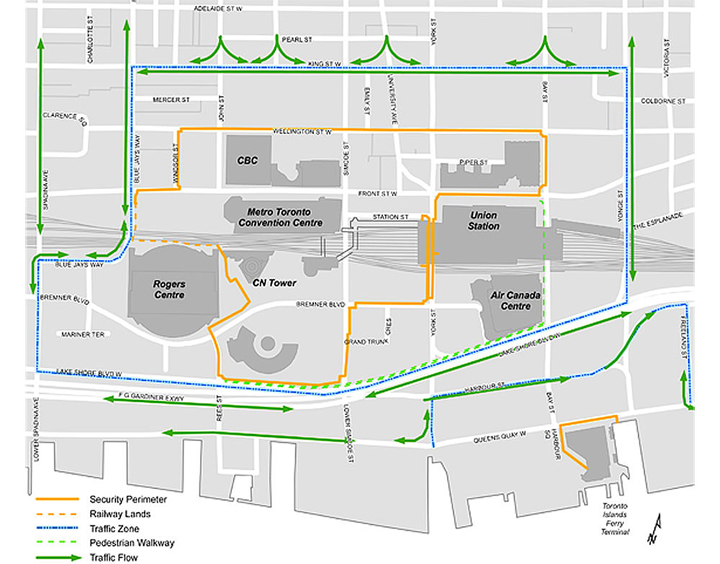
|
||||||
On December 7, 2009, Conservative Prime Minister Stephen Harper announced that the 2010 G20 conference would be held in downtown Toronto: in the financial district of a city of millions. By May 26, 2010, the estimated total cost to the taxpayer was $1.1B. 
Most of the money was allocated to security costs, including a very large police presence drawn from police forces across the region and country. However, millions were also spent on facilities that clearly were unnecessary, including a now-famous $1.2M "fake lake" built for journalists to sit - in Toronto - in Muskoka chairs, watching a huge video screen in front of an artificial lake. 
The Results of the Decision The On the weekend of June 26/27, 2010, political leaders comprising the G20 met in Toronto behind an immense, fenced-off area guarded by police. Automobile and pedestrian traffic was congested. Business operations were interrupted. 
On the Saturday, a subset (perhaps 75 to 100 people referred to as the "Black Bloc") of the thousands of people who had been marching peacefully in opposition to the policies of the G20 broke off from the rest of the group. The Black Bloc lit police cars ablaze and vandalized storefronts (see video footage here). It appeared to peaceful onlookers that the police were doing little if anything to stop the Black Bloc from vandalizing and burning. Indeed, amateur video (e.g., here, here, here, here) taken at the time shows that few if any police were to be found, and those who were present did nothing to stop the destruction. Many concluded that the police essentially did not do their jobs on Saturday. As a result, on Saturday evening, the police were widely being criticized in the media for having done little to stop the vandalism and arson. For example, security expert Alan Bell told CTV News Channel: "When we had them all together, that's when they should have been dealt with". The result was, perhaps, predictable. On Sunday, things swung the other way. There was no reported Black Bloc smashing of windows, and no reported burning of cars. But the police took a hard line against virtually everyone in the downtown blocks near the perimeter fence. The public was initially told that the there was a new law setting out a "five metre rule" that allowed police to search people coming within five metres of the fence surrounding the event. Even after police admitted that there was no such rule, they continued to search peaceful pedestrians, even when such pedestrians wanted to leave the area. In fact, police were searching people kilometres away from the G20 site, without lawful authority, pretending (or thinking) they had such authority. A number of particularly offensive abuses occurred. A group of peaceful political protestors singing O Canada were rushed, pushed and in some instances thrown to the ground by a line of riot police the instant they finished singing the anthem. Hundreds of people were kettled (see video here and here) arrested en masse and caged for hours - in some cases for days - without adequate food, water, or proper washroom facilities. Most were not charged with any offence. Eight days after the mass arrests of people who had been guilty of no crime, Progressive Conservative leader Tim Hudak penned a column for the Toronto Sun. He wrote in part: "I proudly stand behind the men and women of our police services that were faced with a daunting and difficult task of protecting the public against these professional vandals and hooligans." He praised the police even though they had not properly responded during the arson and vandalism on Saturday, and even though the police engaged in illegal searches and abusive mass arrests of innocent people on the Sunday. Journalists and bloggers saw through Hudak, saying his response was a 'swing and a miss' and that Hudak had 'copped-out'. When Ontario most needed an opposition leader to demand answers from the McGuinty government and the police, Hudak instead assumed the role of cheerleader for the police. On December 7, 2010, Ontario's Ombudsman issued his first report concerning his investigation of the province's role in what came to be known as the "secret security regulation": a regulation issued by the government of Dalton McGuinty - not communicated to the public - that gave the police "unconstitutional" sweeping new powers; a new "weapon" for the police. Those who entered the vicinity of the G20 event, he said, had no idea that they were "literally walking into a trap". He called it an "act of public entrapment" and said McGuinty's regulation contributed to "massive violations of civil rights". Liberal Community Safety Minister Jim Bradley said the province would not call for a public inquiry into the G20. Progressive Conservative Leader Tim Hudak likewise has opposed the calling of a public inquiry, claiming as his excuse that it would be too expensive.
In March of 2011, a federal Parliamentary committee recommended:
A Freedom government will require all international political events hosted in Ontario to be held in remote locations, not in our cities. To that end, a Freedom government will support Recommendation #2 of the Parliamentary report. A Freedom government will prohibit cities from cordoning-off public roads and sidewalks for international political events, and will not pledge police support for such events where it is proposed they be held within Ontario's cities and other populated areas. Also, to ensure that in the future Ontarians are better protected both from vandals and arsonists, and from abusive or illegal police responses, a Freedom government will commission an inquiry into the actions of the government and police leading up to and during the G20 event of 2010. Watch Freedom Party's Freedom, Justice, and Peace During |
||||||
|
Copyright © 2011 Freedom Party of Ontario

